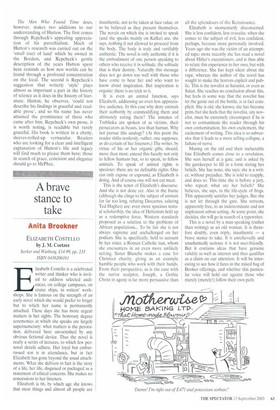A brave stance to take
Anita Brookner
ELIZABETH COSTELLO by J. M. Coetzee Seeker and Warburg, £14.99, pp. 233 ISBN 0436206161 Elizabeth Costello is a celebrated writer and thinker who is invited to address selected audiences, on college campuses, on cruise ships, in writers' workshops. She is famous on the strength of an early novel which she would prefer to forget but to which her name is permanently attached. These days she has more urgent matters in her sights. The honorary degree ceremonies at which she speaks are largely supernumerary: what matters is the peroration, delivered here unvarnished by any obvious fictional device. Thus the novel is really a series of lectures, to which few personal details adhere. Her loyal but embarrassed son is in attendance, but in fact Elizabeth has gone beyond the usual attachments. What she delivers in fact is the story of a life, her life, disguised or packaged as a statement of ethical concerns. She makes no concessions to her listeners.
Elizabeth is 66, by which age she knows that most things and almost all people are inauthentic, not to be taken at face value, or to be believed as they present themselves. The novels on which she is invited to speak (and she speaks mainly on Kafka) are, she says, nothing if not allowed to proceed from the body. The body is truly and verifiably authentic. The novel is only authentic if it is the embodiment of one person speaking to others who receive it in solitude, the solitude that is their destiny. Naturally this message does not go down too well with those who have come to hear her and who want to know about inspiration. But inspiration is organic: there is no trick to it.
It is even an animal function, says Elizabeth, addressing an even less appreciative audience. In this case why deny animals their authority by commodifying them and ultimately eating them? The inmates of Treblinka are spoken of as victims, their persecutors as beasts. less than human. Why not pursue this analogy? (At this point the reader shifts restlessly, rather, one supposes, as do certain of her listeners.) The writer, by virtue of his or her organic gifts, should, more than most, extend this faculty not only to fellow humans but, so to speak, to fellow animals. To speak of animal rights is specious: there are no definable rights. One can only expose or expound, as Elizabeth is doing. And of course one will not eat meat.
This is the tenor of Elizabeth's discourse. And she is not done yet. Also in the frame (although she clings to the subject of animals for far too long, refuting Descartes, saluting Ted Hughes) are: even more specious textual scholarship, the idea of Hellenism held up as a redemptive force. Western standards proposed as a solution to the problems of African populations... To be fair she is not always supreme and unchallenged on her podium. She is, specifically, held to account by her sister, a Roman Catholic nun, whom she encounters in an even more unlikely setting. Sister Blanche makes a case for Christian charity, giving as an example humble people who work with their hands. From their perspective, as is the case with the native sculptor, Joseph, a Gothic Christ in agony is far more persuasive than all the splendours of the Renaissance.
Elizabeth is momentarily disconcerted. She is less confident, less oracular, when she comes to the subject of evil, less confident, perhaps, because more personally involved. Years ago she was the victim of an attempted rape; more recently she has read a novel about Hitler's executioners, and is thus able to relate this experience to her own, but with a difference. She has kept silent about the rape, whereas the author of the novel has sought to make the horrors explicit and public. This is the novelist as Satanist, or even as Satan. She reaches no conclusion about this, but feels in some way that the novelist has let the genie out of the bottle, is in fact cornplicit. She is old, she knows; she has become prim, but she feels that the novelist, any novelist, must be extremely circumspect if he is not to contaminate the reader through his own contamination, his own excitement, the excitement of writing. This idea is so subversive that it leads to a more telling collapse, a failure of nerve.
Musing on the old and their ineluctable fate Elizabeth comes close to a revelation. She sees herself at a gate, and is asked by the gatekeeper to fill in a form stating her beliefs. She has none, she says; she is a writer, without prejudice. She is told to reapply, and does so. This time she is before a jury, who repeat: what are her beliefs? She believes, she says, in the life-cycle of frogs. This apparently satisfies her judges. But she is not let through the gate. She retreats, apparently free, to an indeterminate and not unpleasant urban setting. At some point, she decides, she will go in search of a typewriter.
This is a novel by a man speaking (rather than writing) as an old woman. It is therefore doubly, even triply, inauthentic — a brave stance to take. It is unrelievedly and unashamedly serious; it is not user-friendly. But it contains ideas that have genuine validity as well as interest and thus qualifies as a claim on our attention. It will be interesting to see how it fares in the mixed bag of Booker offerings, and whether this particular voice will hold out against those who merely (merely!) follow their own path.


























































































 Previous page
Previous page